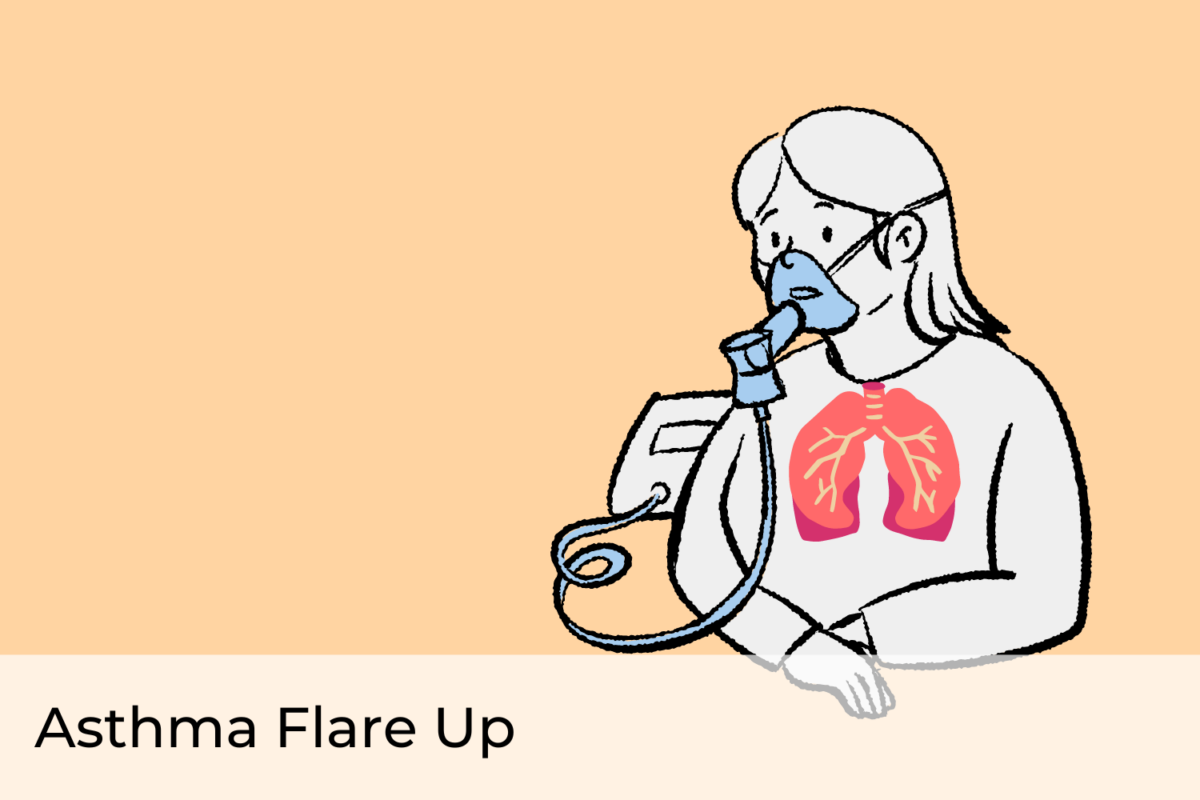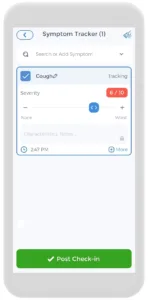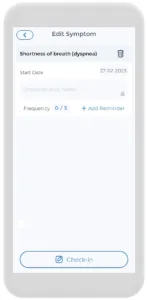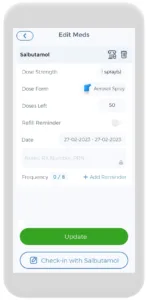
Do you or someone you know suffer from asthma? If so, you’re not alone. Asthma is a chronic respiratory condition that affects millions of people worldwide, making it one of the most common respiratory conditions in the world. Living with asthma can be challenging, especially during an asthma flare up, which can cause sudden and severe symptoms like wheezing, coughing, and shortness of breath. But with the right management strategies and treatment, you can take control of your asthma and reduce the impact it has on your daily life.
This article covers essential information about asthma: its definition, development, and diagnosis. It also delves into asthma flare-ups, their triggers, and prevention methods.
But that’s not all – we’ll also provide you with practical tips and advice on how to manage your asthma effectively, including information on controller medications and rescue inhalers. And if you’re looking for a way to track your symptoms and identify triggers, we’ll show you a step-by-step guide on how to use an asthma diary to take control of your asthma and reduce the risk of an asthma flare up.
Whether you have asthma or care for someone who does, this article aims to equip you with the understanding and tools to manage the condition effectively for a full and active life. Let’s get started![1][2][3][4][5]
Asthma: Understanding the Basics
What Asthma Is, How It Develops, and How to Diagnose It
Asthma is a chronic lung disease that affects millions of people worldwide. It is a condition that causes inflammation in the airways, leading to symptoms such as wheezing, coughing, chest tightness, and shortness of breath. According to the World Health Organization, an estimated 235 million people worldwide currently suffer from asthma, and this number is on the rise. Asthma is one of the most common chronic diseases among children, with approximately 1 in 10 children suffering from it.
The exact causes of asthma are still not fully understood, but both genetic and environmental factors are believed to play a role. Risk factors for developing asthma include a family history of the disease, exposure to certain allergens or irritants such as tobacco smoke, air pollution, and respiratory infections, as well as certain lifestyle factors such as obesity and lack of physical activity.
Despite the high prevalence of asthma, it is a condition that can be managed with proper treatment and self-care. With the help of controller medications and rescue inhalers, people with asthma can reduce their symptoms and improve their quality of life. In addition, keeping an asthma diary can help individuals track their symptoms, identify asthma triggers, and make informed decisions about their treatment plans.
How does Asthma Develop?
Asthma is a chronic respiratory condition that causes inflammation and narrowing of the airways in the lungs, which can lead to trouble breathing. The exact cause of asthma is unknown, but it is believed to be a complex interplay of genetic and environmental factors. Here are some of the factors that may contribute to the development of asthma:
- Genetics: Asthma tends to run in families, and some people may inherit genes that make them more susceptible to developing the condition.
- Environmental factors: Exposure to certain environmental factors can increase the risk of developing asthma. Common asthma triggers include:
- Allergens: Substances that trigger an allergic reaction, such as pollen, dust mites, and animal dander, can cause asthma symptoms in some people.
- Irritants: Exposure to irritants such as tobacco smoke (including secondhand smoke), air pollution, and chemical fumes that are asthma triggers
- Respiratory infections: Viral respiratory infections, such as the common cold, can cause inflammation in the airways and trigger asthma symptoms.
- Obesity: Obesity is a risk factor for asthma, as it can cause inflammation in the body and in the airways, making it more difficult to breathe.
It’s important to note that not everyone who is exposed to these risk factors will develop asthma, and some people may develop asthma without any known risk factors. If you have a family history of asthma or have early warning signs, it’s important to talk to your healthcare provider about steps you can take to reduce your risk of developing asthma or manage your asthma symptoms.
Asthma Symptoms
Asthma is a chronic lung condition that can cause a variety of symptoms, which can range from mild to severe. Here are some of the most common symptoms of asthma:
- Wheezing: This is a high-pitched whistling sound that occurs when you breathe. It’s caused by air passing through narrowed airways in your lungs when you have breathing problems.
- Shortness of breath: This is a feeling of not being able to catch your breath, even when you’re not exerting yourself.
- Coughing: This can be a persistent cough, especially at night or early in the morning.
- Chest tightness: This can feel like a band or weight around your chest, making it challenging to take a deep breath.
- Rapid breathing: This is also called tachypnea, and it’s when you breathe faster than usual.
- Fatigue: Asthma can cause you to feel tired or weak, especially if you’re having trouble breathing.
- Trouble sleeping: Asthma symptoms can worsen at night, making it difficult to fall or stay asleep.
- Use of neck muscles to breathe: In some cases of asthma, the regular muscles used for breathing are insufficient. Therefore, some people with asthma may feel the need to use accessory muscles, like neck muscles, to breathe.
It’s important to note that not everyone with asthma experiences all of these symptoms, and some people may only experience symptoms during certain times, such as during exercise or exposure to allergens. It’s also possible to have asthma and not experience any symptoms for long periods, known as being in remission.
If you experience any of these symptoms, it’s important to talk to your healthcare provider to determine if asthma is the cause. They may recommend further testing, such as lung function tests, to confirm a diagnosis.
How is Asthma Diagnosed?
If you are experiencing symptoms of asthma, your healthcare provider may perform several tests to diagnose the condition. One common test is a peak flow meter, which measures the amount of air you can exhale forcefully. Another test is a peak expiratory flow (PEF) test, which measures how fast you can exhale air. These tests can help your healthcare provider determine how well your lungs are functioning and whether you may have asthma.
Other tests that may be used to diagnose asthma include:
- Spirometry, which measures how much air you can exhale and how quickly
- Bronchoprovocation, which involves inhaling substances that are asthma triggers
- Allergy testing, to determine whether you have any allergies that may be contributing to your asthma symptoms
How is Asthma Managed?
Asthma is a chronic condition that requires ongoing management to control symptoms and prevent flare-ups. Asthma treatment typically involves a combination of medications and lifestyle changes. Here are some key elements of asthma management:
- Medications: There are two main types of medications used to manage asthma: controller medications and rescue medications.
- Controller Medications: Take these medications daily to reduce airway inflammation and prevent asthma symptoms. Typically administered as a rescue inhaler or a pill, they include examples like inhaled oral steroids (oral corticosteroids), leukotriene modifiers, and long-acting beta-agonists.
- Rescue Medications: Use these medications for quick relief during an asthma flare-up. Generally administered via a rescue inhaler, they relax the muscles around the airways to improve breathing. The most common type is a short-acting beta-agonist, like albuterol.
- Peak flow meter monitoring: A peak flow meter is a device used to measure how well air moves out of the lungs. This can help people with asthma monitor their lung function and determine if their asthma is under control or if they need to adjust their medication.
- Avoiding asthma triggers: People with asthma should try to avoid exposure to asthma triggers that can cause asthma symptoms or a flare-up. Common asthma triggers include allergens, irritants, exercise, and respiratory infections.
- Creating an asthma action plan: An asthma action plan is a written plan that outlines how to manage asthma symptoms and flare-ups. It should include instructions for taking medications, monitoring symptoms, and when to seek medical attention.
- Regular check-ups: People with asthma should have regular check-ups with their healthcare provider to monitor their asthma and adjust their treatment plan as needed.
What are Some Conditions that Occur with Asthma?
People with asthma may be more likely to experience other conditions, such as:
- Allergies: Many people with asthma also have allergies, which can worsen asthma symptoms.
- Gastroesophageal reflux disease (GERD): This condition occurs when stomach acid flows back into the esophagus, causing heartburn and other symptoms. GERD can worsen asthma symptoms and make them more challenging to control.
- Sleep apnea: This condition occurs when a person’s breathing is interrupted during sleep. People with asthma may be more likely to develop sleep apnea, which can further worsen asthma symptoms.
- Sinusitis: This condition occurs when the sinuses become inflamed and swollen, causing congestion and pain. People with asthma may be more prone to sinus infections, which can worsen asthma symptoms and make them more difficult to control.
Asthma Flare Ups: When Asthma Becomes Dangerous
What are Asthma Flare Ups?
Asthma flare-ups frighten those with this chronic lung disease. Over 300 million people worldwide have asthma, contributing significantly to emergency room visits and hospitalizations for the condition. The Centers for Disease Control and Prevention report that around 50% of asthma patients experience at least one attack annually.
How can Asthma Flares be Triggered?
Asthma flare-ups can be caused by certain triggers due to a variety of factors, many of which are also common asthma triggers, including:
- Allergens: Allergens such as pollen, dust mites, and pet dander can trigger asthma symptoms in some people.
- Irritants: Irritants such as tobacco smoke, air pollution, and strong odors can also trigger asthma symptoms.
- Respiratory infections: Viral and bacterial infections of the respiratory tract, such as the common cold or flu, can trigger asthma flare-ups in some people.
- Exercise: Exercise-induced asthma is a type of asthma that is triggered by physical activity.
- Emotional stress: Strong emotions such as anger, anxiety, or excitement can trigger asthma symptoms in some people.
- Weather changes: Changes in temperature (such as cold air), humidity, or barometric pressure can trigger asthma symptoms in some people.
- People with asthma need to identify their asthma triggers and take steps to avoid or minimize exposure to them.
When an Asthma Flare Ups be Dangerous?
 Asthma flare-ups can be dangerous, especially if they are severe and go untreated. In severe cases, an asthma flare up can lead to a condition called status asthmaticus, which is a life-threatening medical asthma emergency that requires immediate emergency treatment.
Asthma flare-ups can be dangerous, especially if they are severe and go untreated. In severe cases, an asthma flare up can lead to a condition called status asthmaticus, which is a life-threatening medical asthma emergency that requires immediate emergency treatment.
Signs that an asthma flare up may be becoming dangerous include:
- Increasing difficulty breathing, even with medication
- Bluish tint to the lips or fingernails
- Severe wheezing or coughing
- Rapid breathing or shortness of breath at rest
- Difficulty speaking
- Chest tightness or pain
- Inability to perform daily activities or speak in full sentences
- Confusion or drowsiness
If any of these symptoms occur during a flare-up, it is important to stay calm and seek emergency care immediately. It is important to have an action plan in place for managing asthma flare-ups, including knowing when to seek emergency care. Unfortunately, asthma can be very dangerous and cause people to go to the emergency room.
How to Prevent Asthma Flare Ups?
It is important to seek emergency medical care immediately if you experience severe asthma symptoms or a sudden worsening of your symptoms, as this can be a sign of a life-threatening asthma attack. Some signs that may indicate a severe asthma attack include:
- Rapid worsening of asthma symptoms, despite using quick-relief medications such as a quick relief inhaler.
- Difficulty breathing, or a feeling of tightness in the chest.
- Rapid breathing, or a breathing rate that is faster than normal.
- Difficulty speaking or gasping for breath.
- Bluish discoloration of the lips or face, can indicate a lack of oxygen in the body.
- Confusion, drowsiness, or a feeling of faintness or dizziness.
- In addition to the above symptoms, it is also important to seek emergency medical care if you experience any other symptoms that concern you or that are not improving with your usual asthma medications.
If you experience any of the above symptoms, stay calm and call your local emergency services immediately, or go to the nearest emergency room. Delaying treatment can be dangerous and can lead to serious complications, including respiratory failure or even death.
Using an Asthma Diary
One helpful tool for managing asthma and preventing asthma attacks and flare ups is keeping an asthma diary. This is a record of your symptoms, asthma triggers, medications, and other relevant information related to your asthma. By tracking this information over time, you can identify patterns and take steps to avoid asthma triggers and prevent asthma flare-ups.

Here are some tips for using an asthma diary:
-
- Choose a format that works for you. You can use a paper diary, a digital app, or even a simple notebook to record your asthma symptoms and other information.
- Record your symptoms. Keep track of any coughing, wheezing, shortness of breath, or other symptoms you experience related to your asthma. Note the time of day, the severity of the symptom, and how long it lasts.
- Identify triggers. Take note of any factors that seem to trigger your asthma symptoms, such as exposure to allergens, exercise, stress, or weather changes. By identifying your triggers, you can take steps to avoid them and prevent flare-ups.
- Track medication use. Record which medications you take, when you take them, and how much. This can help you and your healthcare provider see if your medication regimen is working effectively.
- Share your diary with your healthcare provider. Bring your asthma diary to your appointments and discuss any patterns or trends you’ve noticed. This can help your healthcare provider make adjustments to your treatment plan.
Overall, keeping an asthma diary can be a valuable tool for managing your asthma, preventing asthma attacks, and staying on top of your symptoms. Talk to your healthcare provider about how to get started and what information to include in your diary.
The CareClinic App Can Help
Having an asthma action plan is crucial, and the CareClinic app can help with that. You can use the app as your asthma diary. Just go to the diary section of the app and enter your daily symptoms, medications, and triggers as they occur. There are also specific sections on the app to track each of these. Next time you visit the doctor, this information will be handy in your pocket.

For your asthma action plan, the app also has a medication section where you can precisely track the doses you are taking and receive reminders on when to take each medication. We know how difficult but important keeping track of your medications is, so we hope to make it as easy and streamlined as possible.
All in all, asthma is a chronic condition that can become dangerous, especially during flare ups. Understanding the importance of tracking your symptoms can going for regular checkups can help decrease your risk of experiencing serious complications!
Sources
- American Academy of Allergy, Asthma & Immunology. Asthma. https://www.aaaai.org/conditions-treatments/asthma
- Asthma and Allergy Foundation of America. Asthma Flare-ups (Attacks): https://aafa.org/asthma/asthma-symptoms/
- Centers for Disease Control and Prevention. Asthma. https://www.cdc.gov/asthma/default.htm
- Global Initiative for Asthma. Global Strategy for Asthma Management and Prevention. https://ginasthma.org/gina-reports/
- HealthlinkBC. Using an Asthma Diary. https://www.healthlinkbc.ca/illnesses-conditions/asthma/asthma-diary
- Mayo Clinic. Asthma: https://www.mayoclinic.org/diseases-conditions/asthma/symptoms-causes/syc-20369653
- National Heart, Lung, and Blood Institute. Asthma. https://www.nhlbi.nih.gov/health-topics/asthma
- World Health Organization. Asthma: https://www.who.int/news-room/q-a-detail/asthm
References
- “Asthma – Symptoms and causes – Mayo Clinic”. https://www.akamai.mayoclinic.org/diseases-conditions/asthma/symptoms-causes/syc-20369653
- “Reduce Asthma Triggers | American Lung Association”. https://www.lung.org/lung-health-diseases/lung-disease-lookup/asthma/managing-asthma/reduce-asthma-triggers
- “Asthma – Diagnosis and treatment – Mayo Clinic”. https://www.akamai.mayoclinic.org/diseases-conditions/asthma/diagnosis-treatment/drc-20369660
- “Dealing With an Asthma Flare-Up”. https://www.childrensmn.org/educationmaterials/teens/article/9669/dealing-with-an-asthma-flare-up/
- “Managing Asthma Flares | Geisinger”. https://www.geisinger.org/health-and-wellness/wellness-articles/2023/02/28/21/43/managing-asthma-flares
- “Asthma”. https://www.who.int/news-room/fact-sheets/detail/asthma/
- “What Causes Asthma? | American Lung Association”. https://www.lung.org/lung-health-diseases/lung-disease-lookup/asthma/learn-about-asthma/what-causes-asthma


